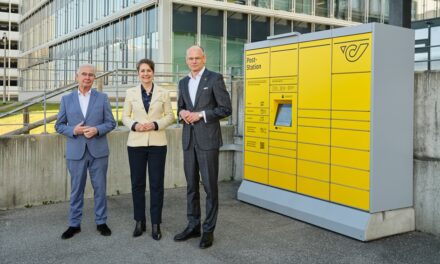
Austrian Post drives trans-o-flex international expansion
Austrian Post is integrating its B2B parcel & logistics subsidiaries into a newly-structured division to offer European combi-freight and industry-specific solutions under the trans-o-flex brand. Further acquisitions are also still on the agenda.
The main business, German-based trans-o-flex, will be regionalised into three units and there will be a sales drive to broaden the customer base and improve the currently “unsatisfactory” profit margin of below 4%. But, contrary to reports, there will be no large-scale job losses or rationalisation measures at the company, which has 1,122 employees.
“Trans-o-flex is the nucleus for Austrian Post’s European strategy. The trans-o-flex brand will in future stand across Europe for harmonised products and standards on the basis of industry solutions and combi-freight,” declared Carl-Gerold Mende, Austrian Post board member responsible for the Parcels & Logistics division, at a press briefing in Frankfurt today.
The central aim, he explained, was to benefit from the German company’s long-standing expertise in combining parcels and pallets (combi-freight) within a single system, its IT know-how and strong position in the pharmaceuticals sector as a temperature-controlled transport provider.
Under the new product strategy, the core trans-o-flex services and its IT system will be rolled out at other European subsidiaries. Temperature-controlled logistics under the trans-o-flex thermod brand, already offered in Germany and Austria, will be extended to Belgium and the Netherlands from January 2009.
Combi-freight services under the trans-o-flex brand will be gradually introduced in Austria, Belgium, Netherlands, Slovakia, Hungary, Croatia and Serbia. The CEE subsidiaries will continue to offer B2B parcel services under their existing brands, but these could also be migrated to the trans-o-flex name over the coming 3-5 years, Mende said.
From January 2009, the Austrian Post Parcel & Logistics division will be structured into five regions: Austria, Central & Eastern Europe; tof North-West (north-west Germany, Netherlands and Belgium); tof Central (south-west, central and north-east Germany); tof South-East (south-east Germany).
Under the regionalisation of trans-o-flex, additional sales staff will be taken on to target SMEs and broaden the relatively limited customer base. Central functions such as finances, operations and sales will remain at the trans-o-flex head office in Weinheim (south-west Germany), where some 400 staff work, and additional IT staff will also be employed.
“Trans-o-flex will not become a parcel carrier,” said Wolfgang Weber, operations director and future head of the new ‘tof Central’ region. “There are no plans for large-scale job cuts or location closures,” he stressed. He was confident that trans-o-flex could win new customers, and noted that the pharmaceuticals sector, generating 55% of revenues, was relatively immune to economic downturns.
However, trans-o-flex, with 2007 revenues of some €500m, has not yet achieved the targeted 4% profit margin, Mende said. “The results are not yet satisfactory,” he commented, but added: “I’m confident we will achieve this target next year.” In general, trans-o-flex should grow more strongly than the overall market, he declared. The overall Parcels & Logistics division, with 2007 revenues of €739m, increased January-September 2008 revenues by 8.2%.
Austrian Post also wants to “revitalise” the trans-o-flex European cooperation network Eurodis by offering the core trans-o-flex services through the network partners, Mende said. But the Austrian group was ready to review structures if the Western European partners were “not strong enough”, he added. On potential future acquisitions, Mende commented: “If acquisition opportunities become available next year, then we would take advantage of them.” Austrian Post would be able to finance any transactions, he said.
In the B2C sector, Austrian Post will test consumer deliveries in selected CEE markets (Slovakia, Hungary, Croatia and Serbia) under its “Post.at” brand next year, but has no plans to offer any B2C services in Germany, Netherlands or Belgium, Mende said.












